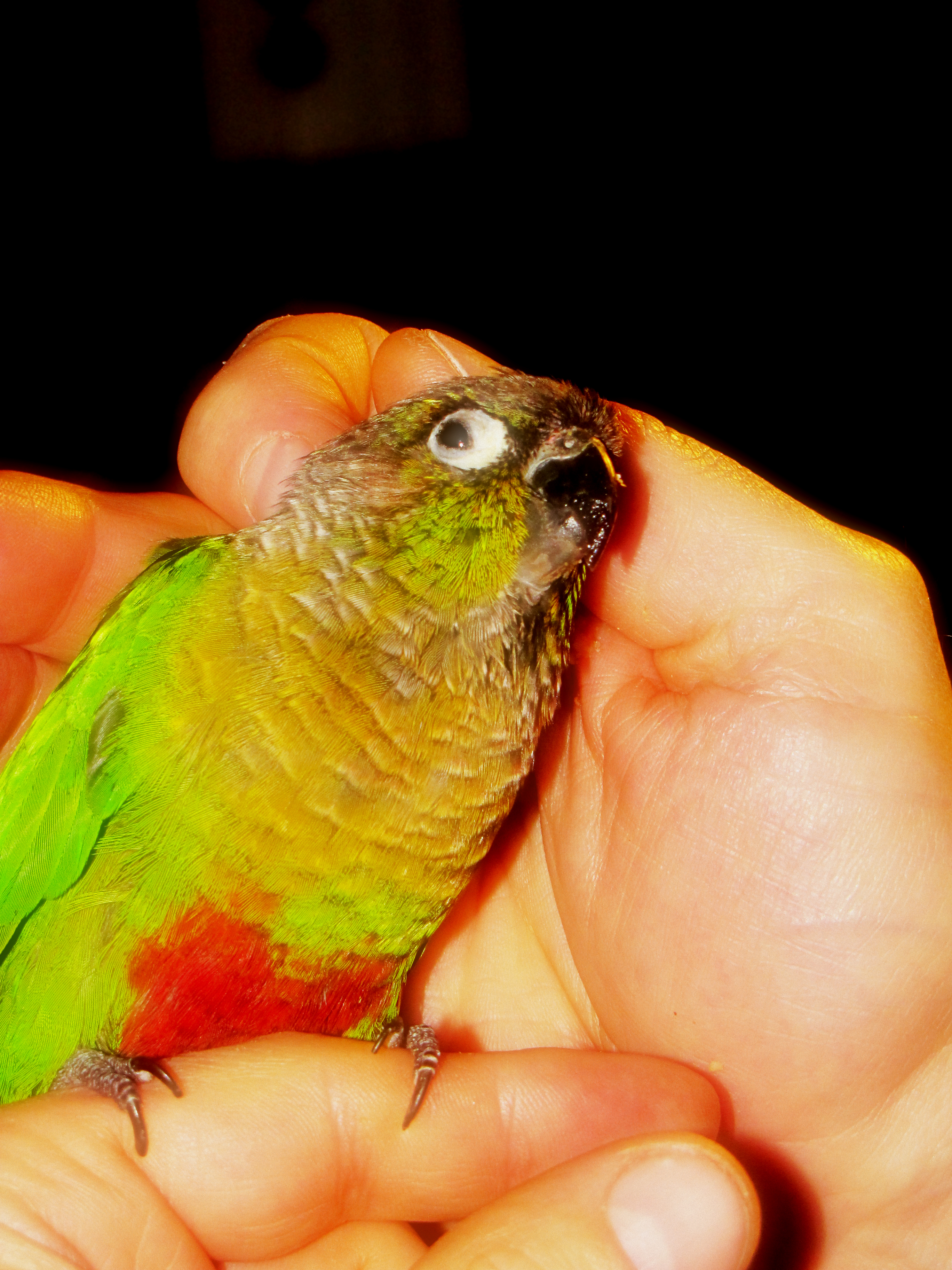January 14, 2011
Chica died today.
Seven years to the day after Heidi died; I found her tiny parrot dead on the floor of the cage, back in the one place she never seemed to go.
Seven years. Exactly. Too strange to be coincidence.
Like with Heidi, I thought somehow we could help Chica become healthy again. For thirteen years, we never had a problem with Chica other than one time nicking a new feather and freaking out over the blood that seemed to pour out. The vet’s cure? Pull the feather out. Oh, and one time she got caught in a toy. Thankfully, I was home or she might have thrashed herself to death out of terror. She started feather picking because of that stress, but a full spectrum light and a cage so jammed with toys she could barely move seemed to help her out of that.
We never saw her sick even for a day. She hung on the sides of her cage and bounced up and down looking for head “scritches” and shredding her tail feathers in the process. Her gentle disposition allowed me to “share” her with the children that came through our home. Expectancy and uncertainty fought in their eyes as they stretched out a finger trying not to snatch it back. I loved watching those eyes widen with delight as the colorful bird stepped up onto their hands, and turned her head sideways to look at them.
Heidi took great joy in her pets. They comforted her when human friends were often few. Becoming severely handicapped in childhood tends to chase away most of one’s peers. Differences can seems frightening for children and teens. But animals don’t care about those. If you love them and tend them, they love you back. Thankfully, most of the pets Heidi had in the last several years, survived, all except for the first parakeet, Mango. He died a couple of months before Heidi.
She tried to cultivate and accepting attitude towards his death, but she took it hard. A sense of foreboding came over me about Heidi when he died, and I wondered if she thought the same.
Then a few weeks after Heidi died, two of her three remaining little friends followed.
Tamiel, her eighteen-year-old chinchilla went home with our niece, Chrissy. But he wasn’t well. I suspect he had been sick for a good two years. He exhibited signs that I now know indicate a fatal GI disorder in chinchillas. At the time, Heidi’s illness overwhelmed us and slight behavioral changes in a pet barely registered. We did not know that like birds, chinchillas tend to hide their illness. Three weeks and many vet visits after Chrissy took him home, Tamiel died in her arms. I really think the Lord may have kept Tamiel alive just for Heidi.
Three weeks after Tamiel’s death, the second parakeet, Battie, died. That left Heidi’s much loved green-cheeked conure, Chica. Like Heidi, Chica loved everyone. For years, having her chirp and bounce in our house was like having just a little bit of Heidi still here.
Then as summer turned to fall, Mike noticed Chica fluffed up and shivering. But that passed. Although I did not know enough about birds to get her to a vet, I felt alarmed, yet suspected the same overactive imagination that warned me Heidi was sicker than I thought was back at it again. Unfortunately, once again, it was right. But I doubt we could have saved Chica. Like Heidi.
For weeks, through holidays, trips home for my youngest brother’s wedding and Christmas, we nursed Chica. Back and forth to the vet’s, and the bills mounted. We shook and measured and syringed medicine down her tiny throat. We cooked up mash and painstakingly hand fed her when she was too weak to eat. I found she liked pancakes. So three times a day I cooked a mini pancake for her. We sliced apples thin and bought blueberry muffins. Anything to get her to eat. And we carried her around the house, tucked under the edge of a sweatshirt or held her in our hands under the warmth of a light.
It seemed like she was getting stronger.
The last night, she did not want to go to bed. Mike held her forever that night. I took her out again at around 1 AM and carried her. When I put her back, she climbed right to the top of the cage and bounced up and down, her head feathered all ruffled up forward towards me. “Chica,” I laughed. “Silly bird. It’s late. Go to bed.”
I left a night light on for her. Covered up poor Reepicheep so he could get some sleep, and went to bed. Mike said she was asleep in her hut when he got up.
When I checked on her, I couldn’t find her, and panicked. Not in her hut. Not on a perch. Could she be jammed in something?
Then back, in the far left corner of the cage, a place she never went, I saw a small bundle of feathers. I reached in and lifted her out, the tears for Heidi I had tried to hold back flooding out. Seven years, to the day, almost to the hour…